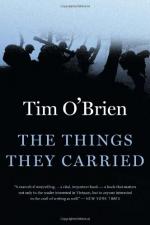|
|
The Things They Carried Topic Tracking: Bravery
Chapter 1
Bravery 1: In this book bravery is often mingled with cowardice. The men want to appear brave, but only because they are afraid of looking silly in front of their friends. The suggestion is that they are not really brave, or at least that they are confused about what bravery is.
Chapter 4
Bravery 2: Even at age twenty-one, Tim knows the difference between a moral action and a socially acceptable action. He knows that being willing to die so that he will not be embarrassed does not make him brave. He wishes he could be truly brave and stand up for what he believes in--he truly does believe that Vietnam is wrong--but something holds him back. He knows it is fear and shame. He does not want to be called a coward, so he goes to war. Even years later, he sees this as pathetic.
Chapter 6
Bravery 3: Strunk and Jensen think that life would not be worth living if they were to get seriously injured: they never want to be in wheelchairs. But when Strunk loses part of his leg, he is terrified, and realizes that above all he wants to live. What he thought was a brave wish has now become ridiculous. Coming close to death has made him realize that his life is much more precious than he thought. He was "brave" when he had nothing to worry about: now that he has faced death, he is very frightened.
Chapter 8
Bravery 4: Curt Lemon is so obsessed with being brave--and making sure his friends know he is brave--that he has a tooth pulled out just to prove he isn't afraid of the dentist. No one else cares about it, but for Curt it is such a big deal that he goes through unnecessary pain to live up to his own distorted idea of bravery.
Chapter 12
Bravery 5: Tim does not feel brave when he kills the young man. In fact, he never makes it clear whether he was the killer or not. He wants to avoid thinking of war as individual acts of bravery: rather, it is made up of general acts of brutality or cowardice. He seems to suggest that although his entire platoon killed that young man together, he will feel guilty for the rest of his life because he was part of it.
Chapter 13
Bravery 6: Tim's only experience with killing an enemy has nothing to do with bravery or valor. Tim saw a Vietnamese soldier who didn't see him, and he threw a grenade. It was an automatic act, and he was most likely in no danger. He suspects that if he had just let the man walk by, nothing would have happened. In this war story, there is no moral, and no goodness behind the murder to make up for it. Tim killed a single man, who posed no threat, because he was afraid and because that is what he had been trained to do.
Chapter 15
Bravery 7: Norman Bowker can't forgive himself for Kiowa's death, even though he knows he was brave many times during the war. He thinks constantly about the shades of courage: why, when he was brave before, couldn't he be brave in that field? Why was the smell worse than any danger? The questions are painful, but he can't stop asking himself for answers.
Chapter 20
Bravery 8: Tim admires Rat Kiley for his courage and tenderness. Rat is good-humored and is a good medic: he takes care of the wounded soldiers even as he is fighting for his life. Tim admires this fearlessness and commitment to duty. He contrasts Rat with Bobby Jorgenson, who was too afraid to help Tim when he was shot. Tim is furious because he depended on Bobby, and Bobby was too cowardly to help him.
Chapter 21
Bravery 9: No one thinks to judge whether Rat Kiley was being courageous or cowardly when he shot himself in the foot. They all understand what he is going through and feel sorry for him. They realize that, sometimes, in a war like Vietnam, judgments like that are irrelevant.
Chapter 22
Bravery 10: Tim doesn't believe he was being brave when he refused to shake the dead Vietnamese man's hand. For him, the peer pressure wasn't as strong as the fear of death--a fear he still can't shake, though he has been dealing with it since he was nine. He seems to suggest that all his stories may be ways to get around the terrifying idea of death.




